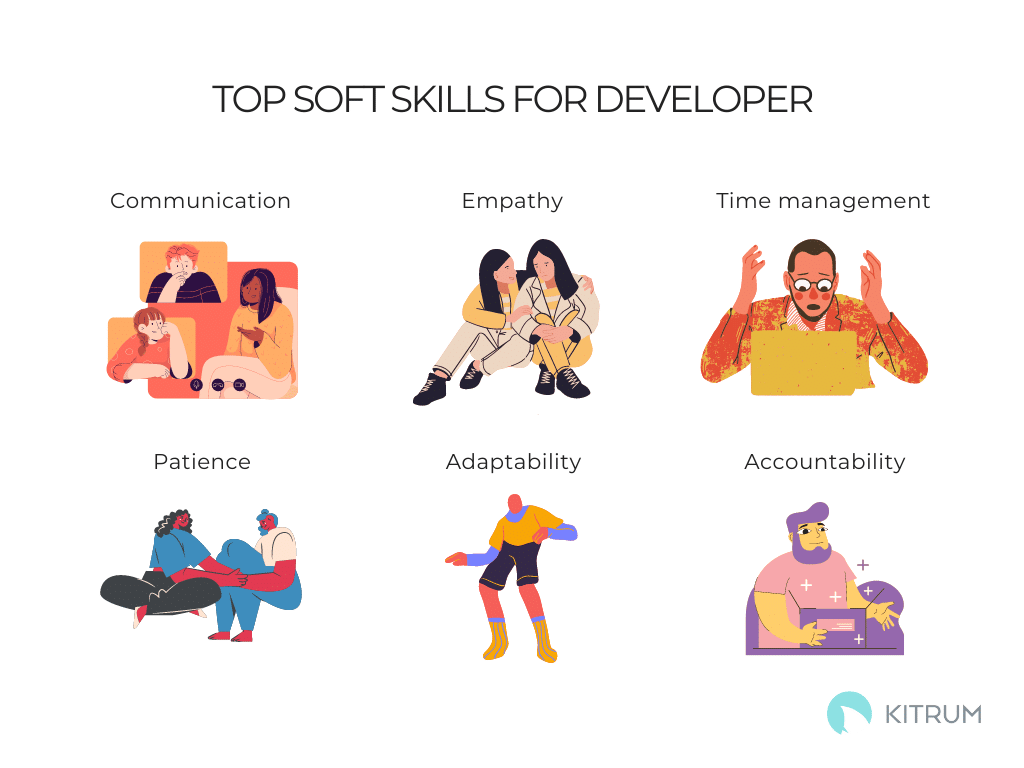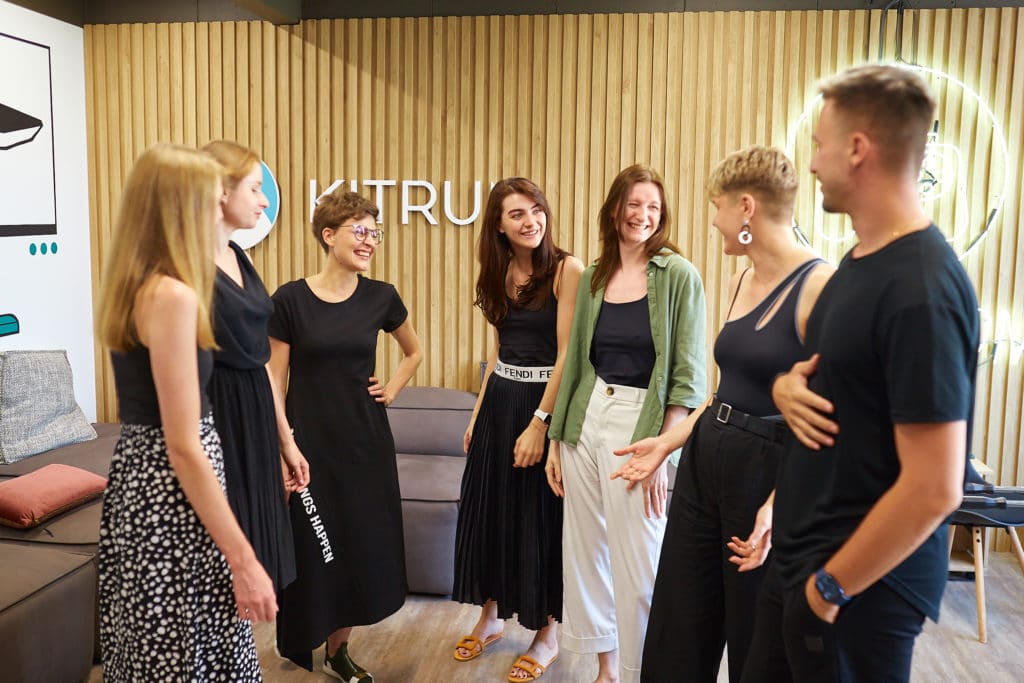Are Soft Skills Really Important for Senior Software Developers?
Let’s say you hire a Senior Software Developer, who meets all tech requirements, but in the end, shows a bad performance. During the hiring stage, you made sure that the employee possessed the amount of knowledge, so what could go wrong?
He just not getting in sync with the team or has a lack of self-motivation, in other words, the new employee has poor soft skills.
“Once I met a genius senior engineer: he knew 8 languages and easily kept up with DevOps part. However, he was unemployed for 8 months in a row because he was conflicting and rude. He has been fired from 6 different companies because he couldn’t click with colleagues,” – says Helen, KITRUM HR manager.
According to the research conducted by Fortune 500 CEOs by the Stanford Research Institute International and the Carnegie Melon Foundation, 75% of long-term job success depends on the level of soft skills employees have. As opposed to the hard skills, which are seen through a resume, it is harder to estimate and find out if the candidate possesses the soft skills. The other stumbling point is to figure out what skillset is crucial for an efficient Senior Software Developer.
Through 6 years of hiring specialists of different levels, we faced those kinds of situations, when the employee lacked certain skills which brought inconveniences in the working process. We learned how to deal with it and how to make sure that the future worker fulfills the requirements for soft skills while interviewing. We are ready to share our insights with you. In this article, we will define the difference between hard and soft skills, identify which soft skills should a Senior Software Developer possess, and give advice on how to check the candidate on those.
Defining the difference: Hard skills vs soft skills
It’s easy to define which hard skills a Senior Software Developer should possess. Hard skills include specialized knowledge and technical abilities. They are pretty precise and can be clarified through education and the projects your candidate worked for in the past. For Senior Software Developer they are the following:
- Software developments
- Object-oriented design (OOD)
- Software testing
- Debugging
- Computer programming and coding
Soft skills are much harder to measure as often you can discover them only during the process of actual work and interaction with an employee. These are the interpersonal skills, which help to build relations within a team and mostly depend on personal traits, such as mindset and behavior. For example, it’s how the person builds communication or reacts to different kinds of situations. Sometimes the lack of temper may result in inconvenience for other team members.
“We had this Developer, Nick, who was brilliant in his work but appeared to be a man of moods. It was hard for him to keep his emotions under control. Once he ended up screaming at the Junior Developer for asking stupid questions. This might have been a traumatizing experience for the Junior Developer.” – shares Mary, KITRUM Team Lead.
Soft skills may include the following:
- Empathy
- Communication
- Time management
- Patience
- Adaptability
- Accountability
- Creativity
There are many more, which are specific for every professional field, as well as the culture, folded within every company. So what soft skills one should look for in a Senior Software Developer to build a prosperous collaboration and bring outstanding results?

Diving into the senior software developer’s soft skills set
There’s so much more behind being a Senior Software Developer showing brilliant work results, than just being able to write codes and have ten years of experience on the track. The real professional, whom you are willing to find, possesses both: hard skills and soft skills. And it’s not an “either/or” option, it’s both: working in sync with a team and catching up with the vibe of the company will make a professional really dedicated to what he does. In 2017, Deloitte also reported that “soft skill-intensive occupations will account for two-thirds of all jobs by 2030” and that hiring employees with more soft skills could increase revenue by more than $90,000.
Senior Software Developer should welcome every project with excitement and interest, restlessly searching for the best solutions not only for the product to work but also for his or her growth and evaluation. Also, he or she is totally aware that it’s the work of the whole team that makes brings the project to life, so it’s all about respect and appreciation of others. Lack of mutual understanding may end up in failing not only the developer’s work, but may also impact the work of others, leading to the collapse of the whole project.
This kind of the approach to working process demonstrated by Senior Software Developer is impossible without mastering a set of soft skills. They are the following:
- Communication
- Problem-Solving and Creativity
- Proactive Position
- Open-mindedness
- Humility and humbleness
Now let’s get deeper into the core of every trait and find out why it is so crucial that your Senior Software Developer has it.
Communication
Communication is a cornerstone of any project built by a group of people. Though essential, according to McKinsey Report on Soft Skills it ranks 3rd place in the list of skills, which are hard to find in candidates. The Senior Software Developer has to be vocal and accurate in sharing his thoughts, ideas, concerns about the project. At the same time, he has to be precise on the work process as stakeholders are always be kept in the loop of the situation. Also sharing wrong information may lead to protractions within the project, as it takes time to figure out the mistake and may even lead to starting work from the onset. All of this may result in time loss and shatter the relationship within a team or, what is worse, with the supervisors.
Furthermore, communication is a two-way street, as building a dialogue requires good listening skills. It’s not only listening to the colleagues but also to the customers and users, as there may hide the answer to core thing the Senior Software Developer is working on. By listening, you get new knowledge, open new possibilities, and discover ideas. In the end, that helps to prioritize and understand what is important at the moment.
Problem-solving and creativity
The skill of problem-solving may be seen as a hard skill, as well as a soft skill. This feature is built-in by default into the mindset of a Senior Software Developer, as solving problems lies in the essence of their job. So they should be critical thinkers, as the range of the problems may differ and there’s no one solution to every problem, even if it seems similar. Also, being stuck on the same pattern, means that the developer isn’t searching for a better solution, as well as doesn’t want to grow.
The problem-solving skill isn’t only about programming, it is also about self-management, coordination of team members, and tasks. So this skill is crucial for showing an effective performance.
Creativity is always led by the desire to evolve and learn new things. Inspiration plays an important role in staying creative. Inspiration is not only about activities aside from work but is also affected by the level of passion for what a developer does. And if there’s no passion for what he does, there’s no creative approach to finding the best, new solution to a problem that may occur. Creativity is what makes a Software Developer expand and built further on it.
Proactive position
The Senior Software Developer should be a game-changer, he has to be ready to act if the situation demands a quick reaction. There’s always a place for improvement – in work, in process, in management and if the developer sees this slot for upswing he or she has to point it out. The Senior Developer is the one who always looks for solutions instead of complaining or passing on responsibility. A proactive position also determines the level of self-motivation and responsibility for the project and the team. If Senior Developer doesn’t possess it, it means he may lack both, which may lead to poor performance.
Open-mindedness
«Stay hungry. Stay foolish.» – Steve Jobs
Open-mindedness is really connected to adaptability. Being able to listen to others and be open to new ideas is where progress comes from. Open-mindedness is also about curiosity and being on track with new discoveries, which can be used at work. Curiosity also leads to trying new approaches without being afraid to make a mistake. Sometimes this fear of failure keeps a software developer from maneuvering and he or she can be stuck in one place.
Being open-minded means being receptive to other people’s feedback regardless of their position, as a lot of insights can be heard if one is open to listening. Another important side of this skill is not being afraid to ask questions.
Working on Adjust project, our dev team was helping to improve the platform for measurement, fraud prevention, cybersecurity, and marketing automation products. Our Senior Developer came up with the solution on how to decrease server load by 30% using CDN.
Humility and humbleness
Working on the project within a team means that not everything depends on the work of Senior Software Developer. He should be accountable for the individualities of other people and understand, that not everything may go smoothly within the project. This takes some humility and humbleness. A Senior Software Developer should be ready to admit his own mistakes and make conclusions out of them. Being humble doesn’t mean being submissive or unconfident. It means that a person can abstract his mind from his own ambitions and see the bigger picture.
It’s important that the Senior Software Developer takes into account the point of view of his or her team members and can show empathy and readiness to change his mind for a better solution. Therefore he can learn from less-experienced colleagues and discover new ways of solving problems or writing code.

How to check your candidate for soft skills during the interview
The soft skills can’t be estimated in precise figures. Use behavioral questions skills to find out if your candidate possesses them. These are the questions about how candidates handled certain work situations, which happened in the past, or the potential ones.
This, together with analytics, will help you analyze his mindset and define the skills and qualities that the Senior Software Developer has exhibited in previous jobs.
Build your questions upon STAR method, which stands for Situation, Task, Action, Result. Moving from one step to another candidate provides you with a comprehensive answer. The concept comprises the following:
Situation: the context within which he/she performed a job or faced a challenge at work
Task: responsibility in that situation
Action: how he/she completed the task or met the challenge
Result: outcomes or results generated by the action taken
The question you ask your candidate will differ from the skills you want to test.
Examples of questions for communication:
Describe a time when you faced conflict and how you addressed it.
Why are you a good fit for this position?
How would you go about persuading someone to see things your way at work?
Examples of questions for creativity and problem-solving:
Describe a time when you had to think “outside the box” and how did you go about it?
Tell me about the situation when you have had to develop a creative approach to problem-solving in order to get the job done.
Give an example of a situation where you used creative or innovative thinking to eliminate frustration with a product or process?
Examples of questions for a proactive position:
What would you do in your first month of working here?
Tell me about a time you improved a process or system.
How do you take responsibility for your mistakes?
Examples of questions for Open-mindedness:
What’s a common misconception people have about you?
What’s the worst job you ever had?
What’s a common misconception people have about you?
Examples of questions for Humility and humbleness:
Imagine that you are starting a company, what would be the three foundational values that you will base your company on?
Have you ever felt like you are missing a skill?
What are the three top factors that helped you to attribute success to life?
Conclusion
As you can see, the soft skillset of a strong Senior Software Developer plays a vital role in performing well-coordinated work, creating a healthy environment for the team, and performing the best results in the project. Though soft skills are harder to define at the first glance, the best candidate will try to demonstrate them both during the interview and further the onboarding process. HR has to be qualified to distinguish whether the future employee shares their values and demonstrates those important qualities. Here at KITRUM, we check if the Senior Software Developer masters communication and creativity is open-minded, and has a proactive position on several stages. Our team consists of an HR and People Manager, Team Lead. They pay special attention to those skills, helping an employee to demonstrate them by creating a friendly and healthy environment, as well as having an eye on those things through years of efficient work.






